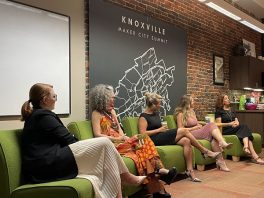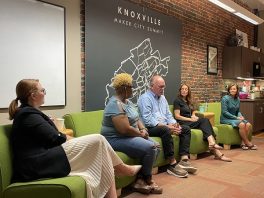News & Events
A lot of questions asked during second sessions of last Thursday’s “Women’s Capital Series”
A spirited group of women peppered two different panels with questions during the second session last Thursday of the “Women’s Capital Series” organized by Catherine Porth and the team at the Let Her Speak nonprofit that she leads.
The questions started almost immediately after the morning session began and continued, albeit at a somewhat reduced rate, during the lunchtime session. The former involved women entrepreneurs who had successfully raised money, while the second session was focused on different types of capital available to entrepreneurs.

The entrepreneurial panel, moderated by Porth (far left), included (left to right): (1) Frog Greishaw, Owner/Operator at Frog Juice Kombucha and the House of Frog; (2) Cortney Jones, Founder of MomSource Network that was acquired by Boulo Solutions where she serves as Chief Revenue Officer; (3) Erica Grant, Founder of Quantal, formerly known as Quantum Lock Technologies, and a soon-to-graduate member of Cohort 4 of the “Innovation Crossroads” (IC) program operated by Oak Ridge National Laboratory; and (4) Melissa Centers, a recent addition to the Knoxville ecosystem who is a consultant to both small start-ups and publicly-traded companies as well as being an attorney and entrepreneur.

Centers also joined the second panel because of her experience managing a venture fund for a large corporation. Others on that panel, also moderated by Porth (far left), included (left to right): (1) Tanika Harper, Founder of the Shora Foundation, Owner of Harper’s Naturals, and Co-Founder of The Women LLC of Knoxville that operates a micro-loan program; (2) John Bruck, Director of the Spark Innovation Center at the University of Tennessee Research Park and also a member investor in Queen City Angels; (3) Centers; and (4) Tiffany Gardner, Senior Vice President and Team Leader of Corporate and Commercial Banking at First Horizon Bank.
Porth kicked-off both sessions, explaining that this is a “space to learn and ask questions.” During their brief opening comments in the morning session, it was clear that each panelist brought unique perspectives from their individual experiences. For example, Greishaw said, “My dad always had his own business,” so following in those footsteps seemed natural. Centers, who moved to Knoxville from Columbus, OH, had perhaps the most diverse experience, noting that “I went to law school on a whim.” She later told me that she has never practiced in a courtroom.
Porth’s opening question for the morning panel was simple but fundamental” “What did you not understand or discovered later?”
- For Jones, it was that “you need more money than you think you will, and it takes longer to raise it than you think it will.”
- For Grant, “It’s a lot of work and a lot more than working with someone else.”
- Centers simply advised those in the room to “build a network before you need it.”
- Greishaw recalled Sue Malone saying during the first program in the three-part “Women’s Capital Series” that she doesn’t invest in anyone who has not failed. “I’m your girl,” she said with a laugh.
- Jones added, “Ask for money if you want advice; ask for advice if you want money.”
- Emphasizing the importance of building something producing a product or service that someone will purchase, Grant said, “It’s never too early to talk to your customers.”
During a discussion on various types of funding that might be available, Porth noted that “there’s a target market for investors just like there is for customers. Talk to a financial expert and determine what type of funding you are seeking” or is most appropriate for your start-up.
To that point, Grant has relied on non-diluted capital like the IC fellowship and government grants. “It’s a lot faster to go the equity route,” she acknowledged. Jones raised all of the funding for MomSource Network from female investors. “I am more grateful for their wisdom than their money,” she said.
Centers reminded attendees of the importance of preparedness before meeting with investors who will pepper an entrepreneur with questions. What is your plan for the money you want to raise? Are you a single point of failure and, if so, how do you mitigate the risk? Do you have the capacity to grow using our funds? What did you learn from having failed at something? She concluded with this advice: “Don’t wait until you’re in a disaster to ask for help.”
The lunchtime panel focused on types of capital available to start-ups. Harper and others at The Women LLC are engaged in micro-lending, supporting those “not bankable or eligible for angel investing. We are not looking to make money. Our ROI (return on investment) is to see businesses not just start but succeed.”
Bruck discussed the various stages of investing, starting with the 4Fs – fools, family, friends, and founders – followed by angel for early stage ventures that might have revenue but also might not. Explaining that venture capital (VC) comes when growth is likely, he added that “angels invest their own money; VCs invest other people’s money.” Gardner discussed loans, noting that “we need to see that you are making money. If not a profit, at least cashflow to repay our loan.”
In terms of how funding decisions are made, each panelist offered her or his respective thoughts.
- “We do look at are you revenue generating,” Harper explained. “We (also) rely a lot on your social capital (such as) how long have you been in business.”
- “The economics have to make sense,” Bruck said. “The returns have to have a likelihood of becoming a reality.” He then talked about the track (i.e., the market the start-up has targeted), the horse (i.e., the technology or secret sauce), and the jockey (i.e., the founder or leadership team). “What will this team be like when something goes wrong? We’re looking for people who can be creative and imaginative.” The most important of the three elements to him is the jockey.
- At the venture stage, Center said that corporate records become much more important. “Are they viable? Are they making money?” Words like disrupt and hustle get a lot of points.” Conversely, the single point of failure can be a problem.
- Gardner emphasized the importance of those seeking a loan being able to admit the risks they are facing in an honest manner.
The third and final two-part session in the series will occur later this month.